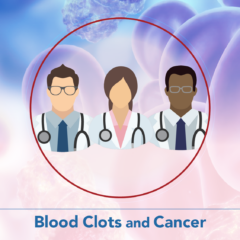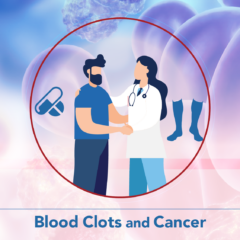Published on
Update on Guidelines for Cancer-Associated Blood Clots
Special Series: Approaches to Patients with Cancer and Thrombosis (Blood Clots)
Plain language summary of Update on Guidelines for the Management of Cancer-Associated Thrombosis (The Oncologist, January 2021)
This research article talks about updates to current guidelines on how best to treat and prevent blood clots in people with cancer. Here are some of the key findings.
- Blood clots are a health concern for cancer patients and their doctors.
- Medicines such as Direct Oral AntiCoagulants (DOACs) and Low-Molecular-Weight Heparin (LMWH) give doctors more options to help treat and prevent blood clots in patients with cancer.
- Doctors now have more options for treating blood clots in cancer patients in the hospital AND not in the hospital.
- Below you will find a table summarizing recent guidelines on preventing blood clots in patients with cancer.
- There are also links to what to know about managing blood clots if you are a patient with cancer in the hospital AND not in the hospital.
Managing Blood Clots in Patients with Cancer: Most Widely Recognized International Guidelines
| Guideline | Strength of Evidence |
| American Society of Clinical Oncology (ASCO) 2020 Venous Thromboembolism Prevention and Treatment in Patient with Cancer, Clinical Practice Guideline Update | – Guidelines developed by expert panel of cancer doctors, surgeons, researchers, patients, and staff. – Conducted review of research. – Only English studies included. – Guidelines are available here |
| National Comprehensive Cancer Network (NCCN) 2022 Guidelines of Cancer-Association Venous Thromboembolic Disease | – NCCN is nonprofit alliance of 30 cancer centers in the US. – Guidelines developed by expert panel of nurses, pharmacists, doctors, and patients. Included one expert from each NCCN center. – Updated every year. – Guidelines are available here. |
| Spanish Society of Medical Oncology (SEOM) 2020 Clinical Guidelines of Venous Thromboembolism and Cancer | – Guidelines developed by 10 members of the Cancer and Thrombosis section of SEOM. – Final guideline reviewed and approved by each member prior to publication. – Guidelines are available here. |
| International Initiative on Thrombosis in Cancer (ITAC) 2022 International Clinical Practice Guidelines for the Treatment and Prophylaxis (Prevention) of Venous Thromboembolism in Patients with Cancer, including patients with COVID-19 | – Guidelines developed by international work group. – Guidelines reviewed by 86 other experts, including patient representatives. – Publication in 2019 included new research on direct oral anticoagulants (DOACs), a class of blood-thinning medications. – Guidelines are available here. |
| International Society of Thrombosis and Hemostasis (ISTH) guidance 2013, 2014, and 2019 | – Includes brief statements drafted by group of doctors and other health professional recognized as experts on the topic. – Recommendations based on groups review of the research. – Guidelines are available here. |
Guidelines for Blood Clot Prevention for Patients with Cancer Who Are in the Hospital (Inpatient Setting)
| Guidelines | Recommendation |
| American Society of Clinical Oncology (ASCO) 2020 | Treatment to prevent blood clots should be considered unless there is a reason it may be harmful (such as a high risk of bleeding or a low platelet count). |
| National Comprehensive Cancer Network (NCCN) 2022 | Treatment to prevent blood clots should be considered unless there is a reason it may be harmful (such as a high risk of bleeding or a low platelet count). Several medications recommended depending on patient situation, including LMWH, unfractionated heparin (UFH), or fondaparinux. |
| Spanish Society of Medical Oncology (SEOM) 2018 | Treatment to prevent blood clots should be considered unless there is a reason it may be harmful (such as a high risk of bleeding or a low platelet count). LMWH preferred |
| International Initiative on Thrombosis in Cancer (ITC) 2022 | Treatment to prevent blood clots should be considered unless there is a reason it may be harmful (such as a high risk of bleeding or a low platelet count). LMWH, UFH or fondaparinux recommended |
| International Society of Thrombosis and Hemostasis (ISTH) guidance 2014 | Treatment to prevent blood clots should be considered unless there is a reason it may be harmful (such as a high risk of bleeding or a low platelet count). LMWH, UFH or fondaparinux recommended DOACs not recommended |
Guidelines for Blood Clot Prevention for Patients with Cancer Who Are NOT in the Hospital (Outpatient Settings)
Current recommendations are similar. Any differing recommendations reflect a lack of firm research about the risks and benefits of prophylaxis (treatment to prevent blood clots) for patients NOT in the hospital.
| Guideline | Recommendation |
| American Society of Clinical Oncology (ASCO) 2020 | – Routine treatment to prevent blood clots with LHWH or – DOACs should NOT be offered to all patients with cancer in outpatient settings. – Patients at high risk may be offered treatment to prevent blood clots and should discuss risks and benefits, including cost. – Patients receiving certain medications (such as thalidomide or lenalidomide) with chemotherapy should be offered LMWH to prevent blood clots. |
| National Comprehensive Cancer Network (NCCN) 2022 | – Consider apixaban or rivaroxaban in high-risk patients with cancer. – LMWH recommended for high-risk patients. – Treatment to prevent blood clots is not recommended for low-risk patients. |
| Spanish Society of Medical Oncology (SEOM) 2018 | – Use tool to assess risk. – Routine treatment to prevent blood clots is not recommended for all patients with cancer in outpatient settings. – LMWH or a DOAC may be considered for high-risk patients with cancer (such as advanced pancreatic cancer). – No agreement on how much or how long to take the medicine, but at least 12 weeks suggested. Discuss risks and benefits of treatment to prevent blood clots. |
| International Initiative on Thrombosis in Cancer (ITC) 2022 | – Routine treatment to prevent blood clots with LHWH or DOACs should NOT be offered to all patients with cancer in outpatient settings. – LMWH to prevent blood clots is recommended for patients with advanced cancer and low risk of bleeding. – LMWH to prevent blood clots is not recommended for patients with advanced lung cancer. – A DOAC to prevent blood clots is recommended for patients at mid- to-high risk using a risk assessment tool. |
| International Society of Thrombosis and Hemostasis (ISTH) guidance 2014 | – Consider apixaban or rivaroxaban in high-risk patients with cancer. – Patients should discuss risks, benefits, and preferences with their clinicians. – LMWH should be considered in high-risk patients who cannot take DOACs. |
Topics That Need More Research
- Blood clots in patients with rare cancers in places like the eyes, brain, sinus, ovaries, and testicles.
- Blood clots in patients with other health concerns related to obesity, kidney failure, and surgery.



